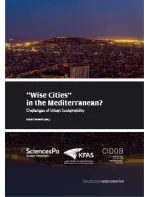“Wise Cities” in the Mediterranean? Challenges of Urban Sustainability

Cities are home to over half the world’s population, consume a majority of its resources and cause a large share of its waste. Cities are both a challenge for global sustainability and crucial for its solution. Their settlement density and networks of creativity provide the space and the ideas for improved resource management. Above all they epitomise the needs and aspirations of their citizens. They are spaces of longing and belonging with promises of social equitability, individual freedom and political participation.
Cities on the southern and northern shores of the Mediterranean are among the oldest in the world and can draw on rich traditions of architecture, urban development and municipal administration. Yet, there are fundamental differences between these cities. Mega-cities like Istanbul and Cairo grapple with different challenges than medium-sized cities along the Côte d’Azur that have higher per capita incomes and better infrastructure. Cities in the north of the Mediterranean also have stronger traditions of municipal self-governance and autonomy.
For all their differences, Mediterranean cities share some of today’s most common urban challenges, such as environmental degradation, gentrification and growing inequality, climate change, provision of services, mass urbanisation, migration, and the fourth industrial revolution, to name just a few. This book seeks to contribute to a necessary debate on the social and environmental sustainability of urban growth in the Mediterranean and beyond.